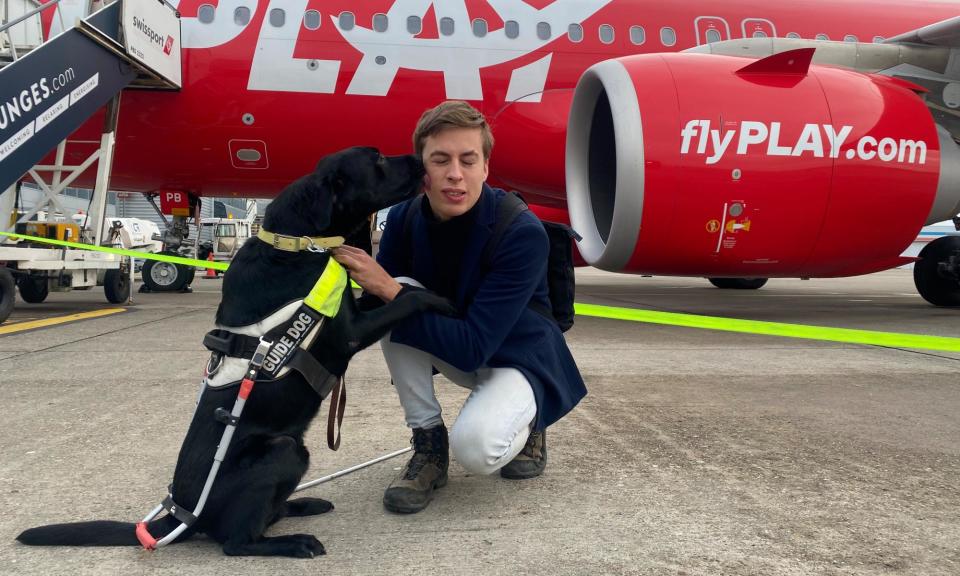‘Max is my eyes’: Paralympian says post-Brexit rules stop him flying with his guide dog

A Paralympic swimmer due to compete in this summer’s Games has said his career is at risk after a post-Brexit policy change barred him from flying in and out of the UK with his guide dog.
Mar Gunnarsson, a visually impaired Icelandic national studying in Manchester, has been unable to fly to sporting championships to represent his country because his guide dog is not recognised as a service animal by the UK authorities.
Government restrictions branded “nonsensical” by disability groups have also stopped him from flying home with his dog to Iceland.
Travellers with disabilities are banned from boarding flights to and from the UK with an assistance dog if the organisation which trained them is not recognised by the Department for the Environment, Food and Rural Affairs (Defra).
Since Brexit, they are also denied boarding unless they obtain an animal health certificate from a vet for each trip to the EU. The certificates, which replace the European pet passport, can cost up to £200.
Gunnarsson, 24, who is also a musician, travels regularly for performances and sporting events, but said he has been grounded since February after the UK’s Civil Aviation Authority (CAA) tightened its rules governing assistance dogs.
The new requirements, based on a memorandum of understanding between the Animal and Plant Health Agency, part of Defra, and UK and EU airlines, restrict cabin access to dogs trained by member organisations of the International Guide Dog Federation (IGDF) and Assistance Dogs International (ADI). Previously, CAA guidelines allowed airlines to carry any formally certified guide dog.
Gunnarsson’s dog, Max, is owned by the National Institute for the Blind, Visually Impaired and Deafblind in Iceland, the animals of which are trained by an official Swedish organisation which is not signed up to either association.
A similar requirement in European Commission regulations was scrapped in 2016 after complaints that it excluded thousands of dogs accredited by government-appointed bodies.
The restrictions are having a massive impact on passengers and have triggered hundreds of complaints, an airline insider told the Guardian.
Service dogs who have not been trained by an IGDF or ADI member have to travel in the cargo hold for a hefty charge and owners face an additional fee of more than £400 for a pre-approval document from the airport, making flights unaffordable for many. Airlines based in non-EU countries have to seek separate permission from APHA to carry service dogs.
“Max has a signed certificate confirming his status from the Icelandic government, but the UK government disregards this,” Gunnarsson said.
“This blatant discrimination is more disabling than blindness. I have reached my limit with sighted individuals in powerful positions throwing obstacles in the path of blind people striving for independence. Max is my eyes and has made my life significantly easier by guiding me through various challenging situations. I refuse to trade him for any randomly assigned guide dog with a bureaucratic stamp from an office in Reading.”
Gunnarsson now has to take a train to mainland Europe to catch a connecting service or flight in order to travel with Max and said the extra time and cost involved are affecting his studies.
According to Samantha Fothergill, the senior legal adviser for the Royal National Institute of Blind People, the UK rules may contravene equality laws. “It’s a breach of EU regulations on air travel for airlines to refuse to carry a recognised assistance dog. This legislation still applies in the UK post-Brexit. We urgently need the government to issue clarification to air carriers confirming that all recognised assistance dogs are permitted to travel, including Max.”
The rules were brought in to prevent non-disabled passengers passing off pets as assistance dogs to avoid cargo charges. In the US, disability rights legislation preventing airlines from requesting proof of official training has led to widespread exploitation and put other passengers at risk.
Campaigners are calling for urgent action to agree an internationally accepted definition of an assistance dog to prevent exclusion and confusion. The European standardisation body, CEN, is working with disability groups on an international training standard which could be voluntarily adopted by any country. However, this could take years to implement.
The CAA has been reviewing its new policy after lobbying by from airlines. An announcement expected this month has been delayed due to the election. The CAA declined to comment for the same reason.
Gunnarsson said that change needs to happen quickly. “I cannot afford to put my life on hold while waiting for diplomats to review their policies,” he said. “The thought breaks my heart that I might have to give Max away if the obstacles in our path become too challenging to overcome.”
